WIFI6 2T2R DUAL BANDS DUAL CONCURRENT MPCIE CARD IEEE802.11AX / AC / A / B / G / N 2.4G / 5GHZ MT7915 AW7915-NPD2 WITH MMCX ANTENNA CONNECTORS
AW7915-NPD is a WiFi6 11ax 2T2R 1800Mbps mini PCIe Module by MT7915DAN for 524WiFi , CE and FCC certified !AW7915-NPD is 2 RF outputs for 2.4GHz, the other 2 RF outputs for 5GHz, and we combine 1×2.4GHz and 1x5GHz to be 1 antenna outputs and dual bands. So there are 2 antennas MMCX RF outputs with dual bands. In Linux “ifconfig” command, you can see two radios, ra0 and rai0, means you can have two radios in the meantime and dual bands dual concurrent with HW AP mode that can serve for 100+ concurrent clients connected at same time.
The AW7915-NPD is a Wi-Fi 6 Mini PCIe Module with the MediaTek MT7915 DAN chipset, offering 1800 Mbps PHY rate (573+1201) and PCIe 2.1 support. It complies with IEEE 802.11ax/ac standards, featuring 2T2R with 4 RF outputs (2 each for 2.4GHz and 5GHz), which can be configured into 2 dual-band outputs. In Linux, it shows two radios for dual-band concurrent use. The module has an optimized RF design and baseband algorithms for high performance and low power use. Its MAC design offloads Wi-Fi tasks from the host processor, enhancing efficiency. The MT7915 DAN ensures high data throughput, security, quality of service, and meets international standards. Its integrated PCIe interface ensures stable connectivity with the host platform.
 The key features of Wi-Fi CERTIFIED 6 work together to ensure that each device on the network is able to function at an optimum level, including legacy devices.
The key features of Wi-Fi CERTIFIED 6 work together to ensure that each device on the network is able to function at an optimum level, including legacy devices.
Key capabilities and benefits
- The operation of Wi-Fi 6E in the 6 GHz spectrum offers extremely wide 160 MHz channels and additional capacity, leading to enhanced network performance.
- Orthogonal frequency division multiple access (OFDMA) more efficiently allocates channels, thereby increasing network efficiency and reducing latency for both uplink and downlink traffic in high-demand environments.
- Multi-user multiple input, multiple output (MU-MIMO) allows more uplink and downlink data to be transferred at once and enables an access point to handle a larger number of concurrent clients
- The ability to utilize a 160 MHz channel increases bandwidth, resulting in enhanced performance with minimal latency.
- 1024 quadrature amplitude modulation mode (1024-QAM) enables throughput increases by encoding more data in the same amount of spectrum.
- Transmit beamforming enhances signal power, leading to significantly higher data rates within a specified range.
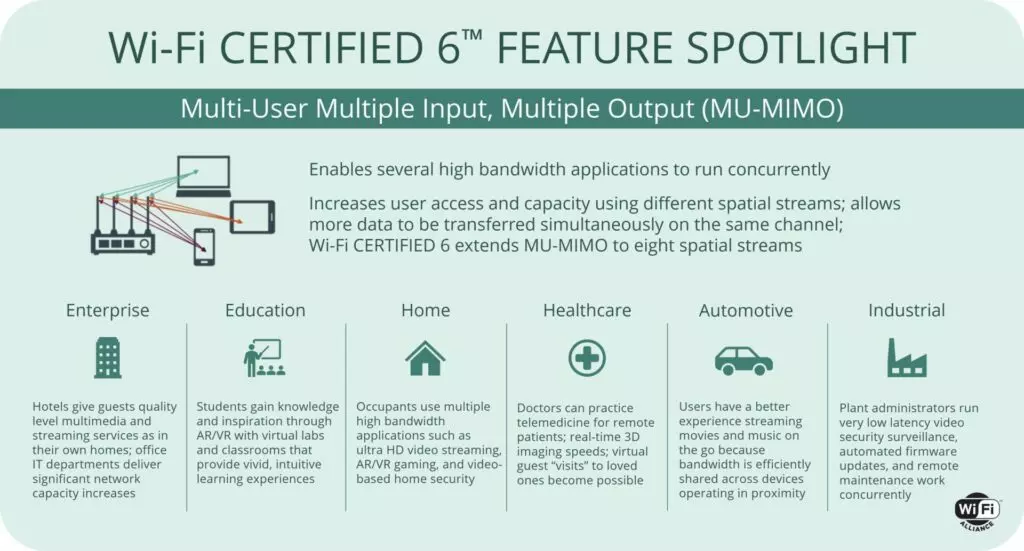 Wi-Fi_CERTIFIED_6_Feature_Spotlight_MU-MIMO
Wi-Fi_CERTIFIED_6_Feature_Spotlight_MU-MIMO
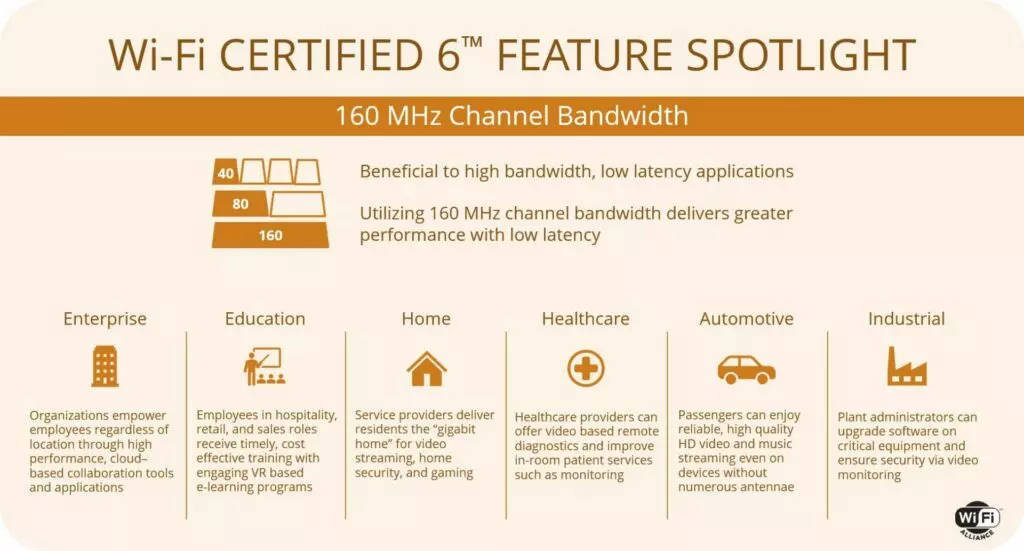 Wi-Fi_CERTIFIED_6_Feature Spotlight_160_MHz_Channels
Wi-Fi_CERTIFIED_6_Feature Spotlight_160_MHz_Channels
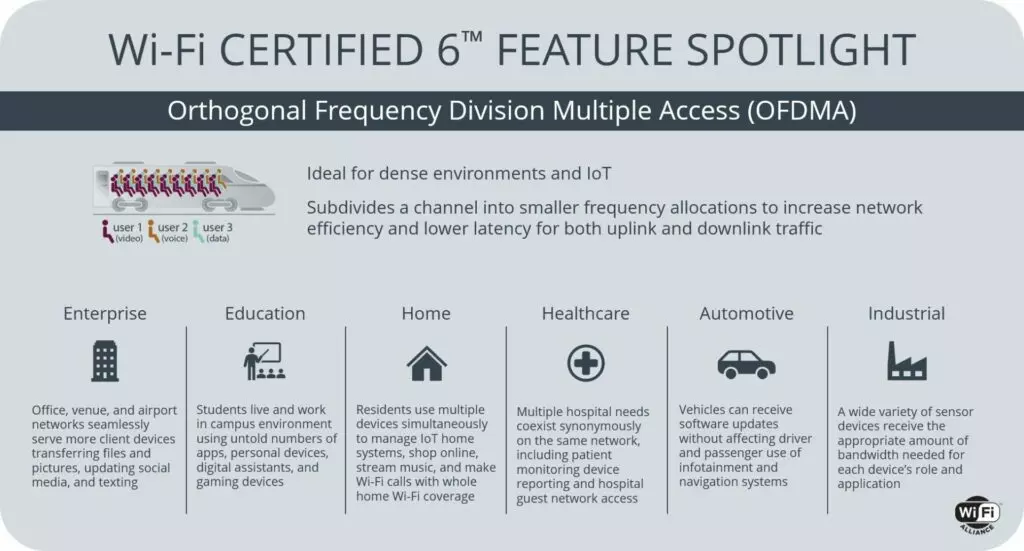 Wi-Fi_CERTIFIED_6_Feature_Spotlight_OFDMA
Wi-Fi_CERTIFIED_6_Feature_Spotlight_OFDMA
Wi-Fi generation comparison overview
| Feature | Wi-Fi 4 | Wi-Fi 5 | Wi-Fi 6 |
| Channel bandwidth (MHz) | 20, 40 | 20, 40, 80, 80 + 80, 160 | 20, 40, 80, 80 + 80, 160 |
| Frequency bands | 2.4 and 5 GHz | 5 GHz | 2.4,5, and 6 GHz |
| Maximum data rate | 150 Mbps | 3.5 Gbps* | 9.6 Gbps* |
| Highest subcarrier modulation | 64-QAM | 256-QAM | 1024-QAM |
| Spatial streams | 1 | 4 | 8 |
| Underlying technology | IEEE 802.11n | IEEE 802.11ac | IEEE 802.11ax |
* Depending upon number of spatial streams and channel used
Product Strengths:
- Diversified Module Specifications: We offer a variety of Wi-Fi modules from basic to high-end, standard to custom sizes, and low-power to high-performance.
- Cross-Industry Applications: Suitable for various industries such as manufacturing, retail, energy, agriculture, etc.
- Quality First: All products undergo stringent quality control and testing.
- Professional Technical Support: Our professional team is always available to provide technical assistance.
- Limited-Time Promotions: We regularly hold promotional activities, allowing you to purchase products at a discount or receive additional rewards.
- We firmly believe that our strategic partnerships with leading chip companies such as Morse Micro and MediaTek will further enhance our product supply and access to cutting-edge technology.
Optimized RF architecture and base band algorithms provide superb performance and low power consumption. Intelligent MAC design deploys a high efficient offload engine and hardware data processing accelerators which completely offloads Wi-Fi task of the host processor. MT7915DAN is designed to support standard based features in the areas of security, quality of service and international regulations, giving end users the greatest performance any time and in any circumstance.
MT7915DAN is designed to support high data throughput over WiFi. The host interface PCIe are integrated to provide stable bandwidth between the host platform and MT7915DAN.
DEEP SLEEP MODE:
Multiple power domains are implement on chip. In deep sleep mode, the PMU could be configured in a low power state to save the power consumption.
Two CPU systems: There are both 32-bits RISC MCU subsystem. The CPU has its local memory. There are several options of clock frequency to provide the optimal performance with the best power consumption. The 32-bit RISC MCU is used to do clocck control, power management, and host interface configuration. PDMA (packet DMA) engines are integrated to support on-the-fly data buffer management.
MT7915AN had the WiFi MAC and BBP subsystem and use with MT7975DN together, which provide the best-in-class radio and low power performance. And the Wi-Fi MAC and BBP subsystem and use with MT7975DN together, which provide the best-in-class radio and low power performance.
With the advent of 802.11ax/ac, multi-user MIMO (MU-MIMO) is defined. MT7915DAN supports MU-MIMO with different configurations.
MT7915DAN BLOCK DIAGRAM

FEATURES:
- 2T2R in 2.4G+2T2R in 5G with support of up to 573+1201Mbps PHY rate
- Supports 20, 40, 80 channels
- HE MCS0-11 BW20/40/80MHz with Nss=1~2
- Short Guard Interval
- Space-time block code (STBC)
- Low Density Parity check (LDPC)
- Support digital pre-distortion to enhance PA performance
- Smoothing (channel estimation) extension to MIMO case
- DFS radar detection
- Embedded ARM Cortex R4 processor for full host CPU offload
- Embedded 32-bit RISC microprocessor
- Support STBC, LDPC, TX Beamformer and RX Beamforme
Decoded BW20/40/80 up to 4×2 MU matrix feedback - Greenfield, mixed mode, legacy modes support
- Highly integrated RF with 40nm low power process
- Noise mitigation:
- Supports background scan function for fast channel switching
- Supports spectrum analysis for non-Wi-Fi signals
- Intelligent power saving
- WFA WMM, WMM PS (QoS), WPA3 supported in latest OpenWRT.
- Integrate high efficiency internal 4G/5G PAs
- Intelligent Calibration (iCal) reduces the production time
- Integrate high efficiency internal 4G/5G PAs
- 2x MMCX antenna connectors for outdoor applications
SPECIFICATION:
| Standards | Wireless: IEEE 802.11ax/ac/b/g/n (2Tx2R) |
| Data Rate | IEEE802.11ax 1201Mbps @TX/RX IEEE802.11ac 1733Mbps @TX/RX IEEE802.11a/n 600Mbps @TX/RX IEEE802.11a/g 108Mbps IEEE802.11b 22Mbps |
| Output Power | 11b: 23dbm+/- 1.5dbm @11Mbps 11g: 20dbm+/- 1.5dbm @54Mbps 11g/n: 20dBm +/- 1.5dbm @MCS7, HT20 17dBm@MCS7,HT40 11a: 19.5dBm +/- 1.5dbm @54Mbps 11a/n: 19.5dBm+/- 1.5dbm @MCS7, HT20 17dBm@MCS7, HT40 11ac HT20: 20+/-1.5dBm @MCS8 11ac HT40: 17+/-1.5dBm @MCS9 11ac HT80: 14.5+/-1.5dBm @MCS9 11ax HT20: 20+/-1.5dBm @MCS9 11ax HT40: 17 +/- 1.5dBm @MCS9 11ax HT80: 14.5 +/- 1.5dBm @MCS11 |
| Receiver Sensitivity | 11b: -99dBm @11Mbps 11g: -95dBm @54Mbps 11g/n: -90dBm @HT20, MCS7 -86dBm @HT40, MCS7 11a: -90Bm @54Mbps 11a/n: -85dBm @HT20, MCS7 -81dBm @HT40, MCS7 11ac: -90dBm +/- 2dBm @VHT20 MCS8 11ac: -85dBm +/- 2dBm @VHT40 MCS9 11ac: -68dBm +/- 2dBm @VHT80 MCS9 11ax: -61dBm +/- 2dBm @HE20 MCS11 11ax: -58dBm +/- 2dBm @HE40 MCS11 11ax: -55dBm +/- 2dBm @HE80 MCS11 |
| Antenna | External Antenna connector (MMCX) x2 |
| Frequency Range | US, Canada 2.412GHz~2.462 GHz (CH1~CH11) EU, Japan: 2.412GHz~2.472GHz (CH1~CH13) 5.15GHz ~5.875GHz |
| Software | Security: 64/128-bit WEP Encryption, WPA, WPA2 Driver: Linux |
| Operating Voltage | DC 3.3V ± 5% |
| Temperature | Operating: 0°C ~ +70°C Storage : -20°C ~ +90°C |
| Humidity | Operating Humidity: 10%~90% non-condensing Storage Humidity: 10%~90% non-condensing |
| Dimension | 50.95(H) x 30(W)mm |
Power consumption maximum is 9W, average is 4 – 8W
Main board Power Supply design please provide 3.3V 3A, minimum 3.3V 2.5A.
AW7915-NPD can work on OpenWrt 21.02 version OS directly, no need to install the driver to support this MTK chipset.
OpenWRT porting guide example – read here
Please check if you are able to integrate drivers in to your system. Please check with below link to download 11ax driver.

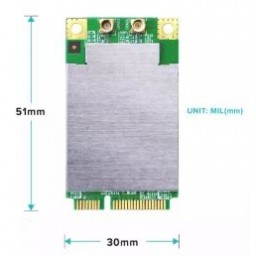




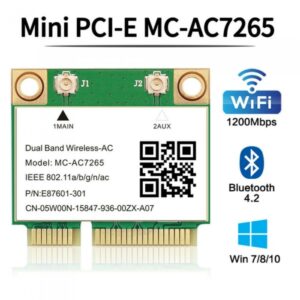
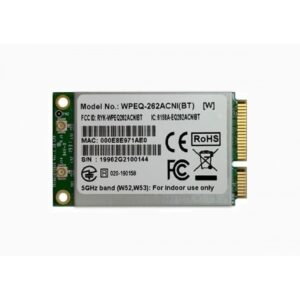
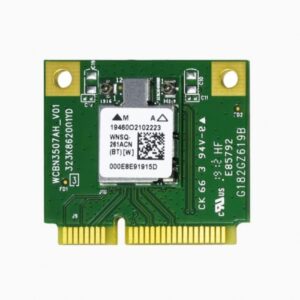

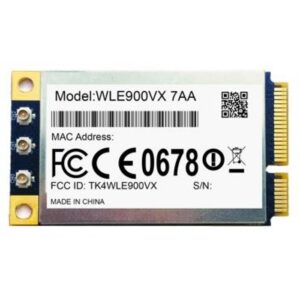
Reviews
There are no reviews yet.